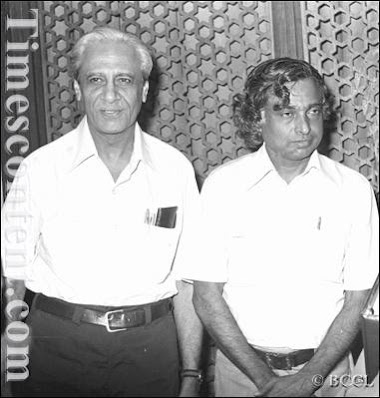“Let me tell
you about my experience. In 1973 I became the project director of India's
satellite launch vehicle program, commonly called the SLV-3. Our goal was to
put India's "Rohini" satellite into orbit by 1980. I was given funds
and human resources, but was told clearly that by 1980 we had to launch the
satellite into space. Thousands of people worked together in scientific and
technical teams towards that goal.
By 1979, I
think the month was August we thought we were ready. As the project director, I
went to the control center for the launch. At four minutes before the satellite
launch, the computer began to go through the checklist of items that needed to
be checked. One minute later, the computer program put the launch on hold; the
display showed that some control components were not in order.
 My experts I had four or five of them told
me not to worry;
they had done their
calculations and there was enough reserve fuel. So I bypassed the computer, switched to manual mode and launched The
Rocket. In the first stage, everything worked fine. In the second Stage, a
problem developed. Instead of the satellite going into orbit, the whole rocket
system plunged into the Bay of Bengal.
It was a big Failure.
My experts I had four or five of them told
me not to worry;
they had done their
calculations and there was enough reserve fuel. So I bypassed the computer, switched to manual mode and launched The
Rocket. In the first stage, everything worked fine. In the second Stage, a
problem developed. Instead of the satellite going into orbit, the whole rocket
system plunged into the Bay of Bengal.
It was a big Failure.
That day, the
chairman of the Indian Space Research Organization, Prof. Satish Dhawan, had
called a press conference. The launch was at 7:00 am, journalists from around
the world were present was at 7:45 am at ISRO's satellite launch range in
Sriharikota [in Andhra Pradesh in southern India]. Prof. Dhawan, the leader of
the organization, conducted the press conference himself. "We failed! But I have a very good trust in my team
that next time we will be succeeding for sure".
Prof. Dhawan took responsibility for the failure he said that the
team had worked very hard,
but that it needed more technological support. He assured the media that in
another year, the team would definitely
succeed. Now, I was the project director and it was my
failure, but instead, he took responsibility for the failure as chairman of the
Organization.
The next
year, in July 1980, we tried again to launch the satellite and this time we succeeded. The whole
nation was jubilant and cheering for the success of the launch. Again,
there was a press conference Prof. Dhawan called me aside and told me now “You
conduct the press conference today.”
Well, this sum
up what Leadership is all about! Leadership is not just about 'leading' someone to achieve a task but it is
about 'empowering' someone to
achieve far Greater deeds. One needs no bigger support than a Leader like
Prof. Satish Dhawan to achieve things that have never been achieved before. The
'Trust' that Prof. Dhawan had in his team and the willingness to take
responsibility when they fail, is something everyone should look upto and learn
in order to become a True Leader.
Dr. Abdul Kalam cherished this experience as
one of the high moments in his journey. Right way never change the goal… Try to
be a master… be a role model… And be a leader… There is lot of wants here!